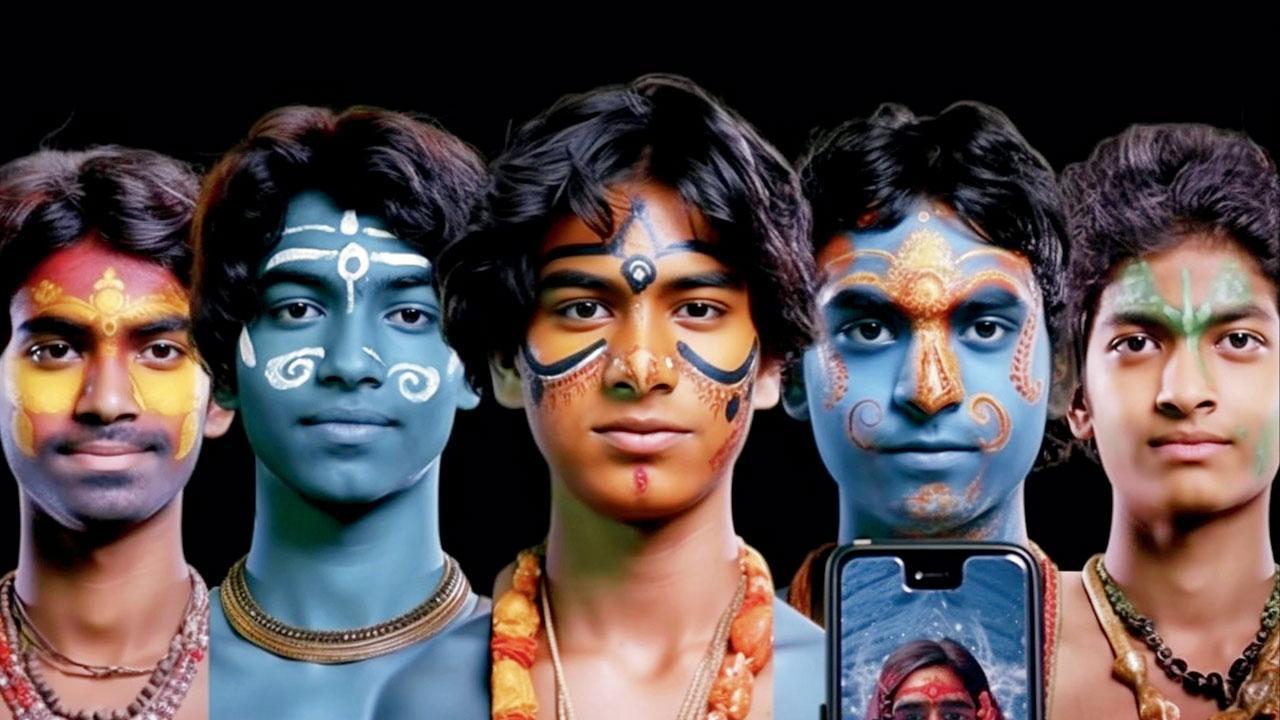Does a parent have the automatic right to know everything about their adult child? And do they have the right to tell their children’s stories, choosing what to include or what to leave out?

Your Gen Z child ensures privacy by cutting their life into pieces and deciding which one they will present to whom. Their TikTok persona will not be like their Insta one. Illustration by C Y Gopinath using Midjourney
 Did you know,” said my friend Gulan, “that it is now considered rude among today’s younger generation to ask a person where they are from?”
Did you know,” said my friend Gulan, “that it is now considered rude among today’s younger generation to ask a person where they are from?”
I didn’t know, but the question was familiar from conversations in trains, park benches and waiting rooms. For the average Indian meeting, two bits of information, a person’s ‘native place’ and surname, sum up everything about the stranger. The surname—Sharma, Iyer, Tripathi, Srivastava—gives away the caste, while the place reveals the culture.
“Perhaps they don’t want to be mischaracterised based just on origin and name,” I said.
But I knew this could not be true. We already give away terrifying amounts of personal information to social media. Moreover, travel and cross-cultural marriages have blurred most caste and cultural distinctions.
“Everyone has become privacy conscious,” Gulan said. “You never know when you’ll accidentally say something harmless and offend someone.”
That experience will be familiar to many boomer parents with children in their 20s.
Anik (not his real name) was a devoted boomer father who had sworn that he would be a better parent to his child than his father. But with the grind of daily life and work, he did not think he had passed on all his accumulated insights and wisdom about work, love, friendship, living and dying to his son when he left to study physics at UCLA.
Deciding to have those conversations on his blog instead, he crafted a series of posts as letters to his son, advising him with wit and sagacity (he thought) on dealing with loneliness, a new culture, exploring a new city, dealing with illness, eating well, and so on.
One post, warning his boy about the homesickness and loneliness and the need to find inner resources for coping with them, became a viral hit—but only among other empty-nesters with children in university. He had unwittingly echoed the sentiments of hundreds of parents wanting to hug and reassure the child they missed so much.
Nothing prepared Anik for his son’s explosive reaction when he shared the viral post with him. “You’ve exposed me!” he cried. “Everyone knows about me now, and you’ve decided what they should know. I look like a fool.” The young man angrily asked his father to cease and desist with the well-meaning posts.
Most excruciating for Anik was learning that his son had not felt homesick or lonely. He had naively assumed the son’s departure from the nest would be like his own.
Another parent’s very clever daughter quit school, finding the Indian curriculum “mindless”, and spent several years tiddling with her computer at home. When the worried parents investigated, they discovered she had built a thriving YouTube channel with nearly half a million subscribers addicted to her product—old movie mash-ups where she stitched together clips from old movies into brand new stories.
When the gobsmacked parents told her how proud they were of her unexpected talent, she had a furious meltdown, accusing them of not respecting her privacy.
A study by the Center for Generational Kinetics of over 1,200 people aged 14-59 explored the mindset, preferences, and expectations of differences in the way privacy and safety are perceived by four generations—Baby Boomers, Generation X, Millennials and Generation Z. Not surprisingly, Gen Z-ers, those born after 1996 and who grew up using the Internet, had the most nuanced understanding of privacy.
Your Gen Z child ensures privacy by cutting their life into pieces and deciding which one they will present to whom. Their TikTok persona will not be like their Insta one. Authenticity is more important than accuracy. Most choose avatars to disable facial recognition.
They understand that life is a stage where you will connect not only with friends but also with prying parents, employers, corporations and the government. None of them need to know everything, so Gen Z ensures its safety and privacy by concealing and compartmentalising, creating multiple accounts and personas for disparate audiences.
Your children are the most secretive and privacy-conscious generation ever born.
I have always told other people’s stories, sometimes making a guest appearance in them. The pen was mine, so I was the narrator, the arbiter of accuracy and what was shareable.
We often forget that our memories are fickle and deceptive. Our stories are always reconstructions, evolving with time, and we only tell them as best as we recall, embellished with what might or should have been. My generation was promiscuous with other people’s stories and did not respect anyone’s privacy, but we also did not have a Facebook to amplify our misdeeds.
All that has changed.
Our Gen Z children make us aware that parents do not have the automatic right to ask for or be told their children’s stories. It is theirs to create and tell to the audiences they choose. Parents must go through the pain of realising that they are only one of many compartments in their child’s life. They will be shown whatever is appropriate.
Sometimes, that may not include the native place.
You can reach C Y Gopinath at cygopi@gmail.com
Send your feedback to mailbag@mid-day.com
The views expressed in this column are the individual’s and don’t represent those of the paper.
 Subscribe today by clicking the link and stay updated with the latest news!" Click here!
Subscribe today by clicking the link and stay updated with the latest news!" Click here!








